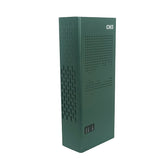The legality of jammers in the world
Jammers are often used around prisons and detention centers to prevent prisoners and detainees from communicating with the outside world without authorization or supervision. Brazil, India, New Zealand and Sweden are countries that have been exempted or are considering not using cell phones and WiFi jammers near prisons, while in the UK this has become legal since 2012.
However, some countries have authorized or proposed to expand the use of jammers. For example, in India it is stipulated that jammers can be used in schools, mosques and theaters, provided that it can be proven that the interference will not exceed its interference range. For a short time, the jammer was also approved for use in theaters and concert halls, but the jammer was discontinued in 2012.

So what if you end up legally owning a cell phone jammer? You might consider booking your next flight to ... Ukraine. Because the government has taken the initiative to prevent students from using cell phones to cheat on exams, it is one of the few countries in the world where wifi jammers are legal.
Buying jammers is easy, but where can you use them?
Techniques of deliberate interference with electromagnetic frequencies (also known as interference) have been implemented in various devices, which are gradually being provided to individuals and organizations. Jammers are getting smaller, more portable, easier to use, and cheaper, despite the fact that jammers are illegal in most countries around the world. Although some phone jammers can block communication indiscriminately, there are several types of special equipment specifically designed to block certain signals. Among them, the most popular are cell phone jammers, wifi jammers, drone jammers, and even GPS jammers.
In most countries / regions, authorities most often disapprove of the use of these devices, the main reason being that their impact often exceeds expectations. Even deliberate use, such as banning the use of cell phones in schools, theaters, and hospitals, or preventing drones from flying over private property, can cause interference beyond expectation. 911 calls were interrupted, drones fell from the sky and air traffic control was disrupted. Here are some unintended consequences of jammers. This interference has led countries like South Africa and Israel to regard these jammers as illegal.
Another reason is that the authorities want to retain exclusive control over the use of these measures for law enforcement, security and military purposes. The United States, Canada, and India are a few examples of countries that prohibit certain people (except certain law enforcement agencies) from using GPS jammers. Italy goes further, even these agencies can only operate jammers with specific authorization. In Pakistan, Singapore and Iran, the disruptor is only legal for the licensee, and it can be assumed that it is not easy for non-government entities to obtain these licenses.













